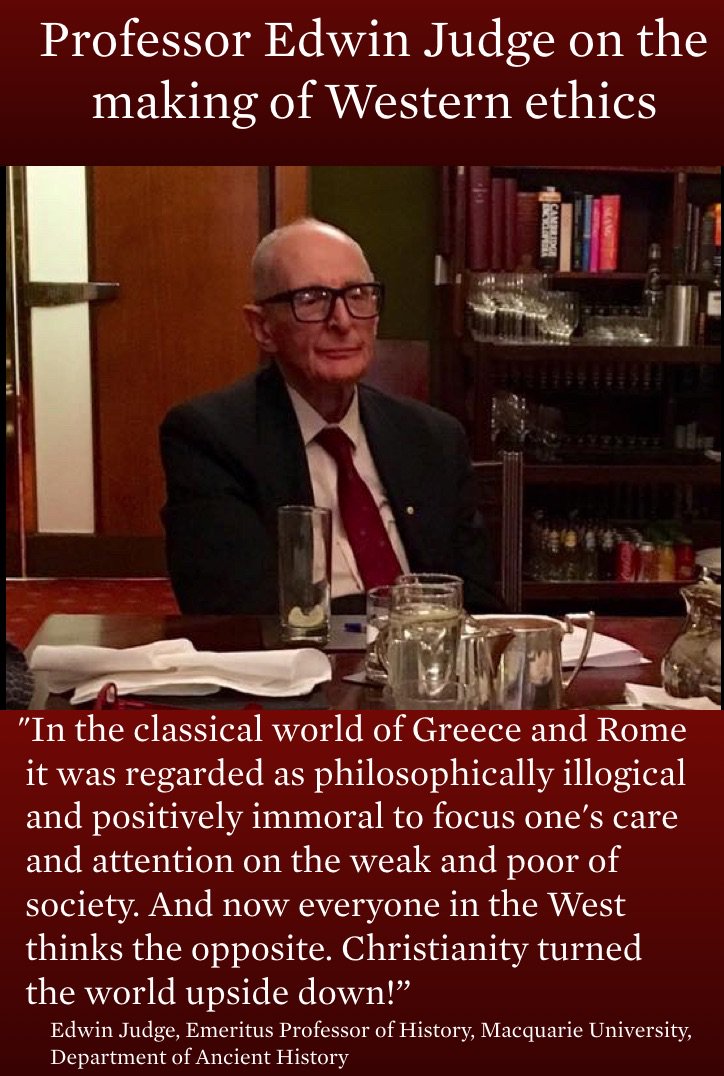
WONDERFUL!



“Men are qualified for civil liberty in exact proportion to their disposition to put moral chains on their own appetites—in proportion as their love to justice is above their rapacity;—in proportion as their soundness and sobriety of understanding is above their vanity and presumption;—in proportion as they are more disposed to listen to the counsels of the wise and good, in preference to the flattery of knaves. Society cannot exist unless a controlling power upon will and appetite be placed somewhere, and the less of it there is within, the more there is without. It is ordained in the eternal constitution of things that men of intemperate minds cannot be free. Their passions forge their fetters.”
(Edmund Burke, A Letter From Mr. Burke To A Member Of The National Assembly, 1791.) ![]()
“Culture will eat strategy’s lunch every time.”
Attributed to Peter Drucker
“I think ironically American evangelicals often seem to be more followers of Benjamin Franklin that they are of Jonathan Edwards. They [evangelicals] admire practicality, friendliness, moralisms, easy formulas, and quantifiable results. And while these Franklin-esque traits aren’t all bad they sometimes contribute to evangelical superficiality.”[1]
George Marsden
[1] George Marsden, “The Legacy of Jonathan Edwards,” Beeson Divinity School, Nov. 12, 2004. Emphasis added. The two major feeder streams coming early into American culture are the Enlightenment and Puritanism. See David A. Hollinger, “The Accommodation of Protestant Christianity with the Enlightenment: the Old Drama Still Being Enacted,” Daedalus, the Journal of the American Academy of Arts & Sciences, 141 (1) Winter 2012 and Marshall Shelley and David Goetz, “The Weapons of War: an Interview with James Davison Hunter, Leadership Journal, Spring 1993: 14-15.
Many of us are tempted by “chronological snobbery,” the term C.S. Lewis made famous. We assume (as J.I. Packer once put it), that “the newer is the truer, only what is recent is decent, every shift of ground is a step forward, and every latest word must be hailed as the last word on its subject.”
Nietzsche said, “All truths are bloody truths for me.”
Yes, truth will set us free, but first we must face the bondage we love.
Real learning requires the risk of putting yourself in the vulnerable position of realizing how wrong you may be.
Democracy in America by the Frenchman, Alexis de Tocqueville is one of my favorite books. Tocqueville had an acute eye for this budding American experiment in democracy. In light of the debate tonight, listen to his wisdom and keep in mind he wrote this in the 1830s!:
“A false notion which is clear and precise will always have more power in the world than a true principle that is obscure or involved.”
Recently, I listened to a sermon by Howard Hendricks. Hendricks taught for sixty years at Dallas Theological Seminary. He died in 2013. In the message, Hendricks described one of his favorite poems, “The Night They Burned Shanghai” by Robert Abrahams. It tells of a couple driving to play Bridge with some of their friends. As they are en route they survey what is going on in the world. The luxury of playing Bridge is juxtaposed with various world tragedies. The poem ends with these arresting lines:
Tonight Shanghai is burning
And we are dying too
What bomb more surely mortal
Than death inside of you
For some men die by shrapnel
And some go down in flames
But most men perish inch by inch
In play at little games.
The first obligation of religion is to maintain the sense of the value of human beings. If you had to summarize the Old Testament, the summary would be: stop doing this to yourselves. But it is not in our nature to stop harming ourselves. We don’t behave consistently with our own dignity or with the dignity of other people. The Bible reiterates this endlessly.
(Pulitzer winner, Marilynne Robinson)
http://www.theparisreview.org/interviews/5863/the-art-of-fiction-no-198-marilynne-robinson
“No one seems to have noticed, that a loss of a sense of shame means a loss of privacy; a loss of privacy means a loss of intimacy; and a loss intimacy means a loss of depth. There is, in fact, no better way to produce shallow and superficial people than to let them live their lives entirely in the open, without concealment of anything.”
Theodore Dalrymple: Our Culture, What’s Left of it
(HT: Mark Sayers)